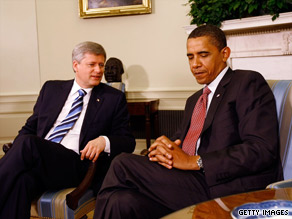Afstan: Obama plays for time//Helmand mistake?/The "Bandwagon"
There are no immediate plans to commit more U.S. troops to the ongoing war in Afghanistan, President Obama said Wednesday.Is our prime minister playing for time too (see end here) and is it running out?
Canadian Prime Minister Stephen Harper, left, and President Obama meet in Washington on Wednesday.
"I'm going to take a very deliberate process in making those decisions," Obama said. "There is no immediate decision pending on resources, because one of the things that I'm absolutely clear about is you have to get the strategy right and then make a determination about resources."
The United States has about 62,000 U.S. troops in the country, and NATO allies -- including Canada -- have another 35,000. The Pentagon is planning to add 6,000 troops by the end of the year.
There have been indications that Obama soon could be asked to commit even more American troops. Defense Secretary Robert Gates, however, has signaled he would like to gauge the impact of the 6,000-troop increase before considering whether to send more.
Support in the United States for the war in Afghanistan has dipped to an all-time low. Just 39 percent of Americans favor the war, while 58 percent oppose it, according to a national CNN/Opinion Research Corp. survey released Tuesday...
Obama thanked Harper for his country's commitment to Afghanistan, where more than 2,800 Canadian troops and dozens of civilians are stationed.
"They have fought; they have had staying power; they have absorbed losses that we all grieve for," he said...
Harper said Wednesday that "Canada is not leaving Afghanistan" but is "transitioning from a predominately military mission to a mission that will be a civilian humanitarian mission after 2011."..
2) Helmand and Kandahar (note no mention of CF at Kandahar or of Brits at Helmand):
The Afghanistan Problem: Why Are We [U.S] in Helmand?Via Norman's Spectator. The troops at Helmand are Marines, list of units here. I'm not sure they could have been deployed to Kandahar this spring. A US Army combat aviation brigade (ordered deployed under President Bush) was arriving at KAF around the time the Marines were coming to Helmand. At that time there certainly would not have been the facilities at Kandahar to accomodate both the 8,000 new Marines (who have their own aviation) and the Army aviation brigade. I wonder if the Marines alone would not have been too much at that time. And should the aviation brigade been deployed to Helmand instead of KAF? Moreover some 2,000 Marines were already operating in Helmand and it may have seemed most logical to reinforce them. Logistics are important. And very early this year, when the Marine deployment plans were being set, Kandahar may not have seemed to be in too bad a situation. The matter is more complicated than the story suggests.
The military's strategy in Afghanistan has been misguided from the start — but it may be too late for Plan B.
...not all of the 21,000 additional forces that President Obama authorized for Afghanistan last winter have even arrived in the country yet...the battle plan those troops were asked to execute was devised primarily by General David McKiernan, who was replaced about the time the troops started arriving. McKiernan's plan reflected his experience in conventional warfare: he chose to deploy the troops where the bad guys were — largely in Helmand province on the Pakistani border, home of nearly 60% of the world's opium crop, a place that was firmly in Taliban control. But pursuing conventional warfare in Afghanistan is about as effective as using a football in a tennis match. The Army's new counterinsurgency doctrine says you go where the people are concentrated and protect them, then gradually move into the sectors the bad guys control. That is not what we're doing in Afghanistan. In addition to all the other problems we're facing — the corruption of the Karzai government, the election chaos, the porous Pakistani border — it has become apparent that we're pursuing the wrong military strategy in this frustrating war...
...The additional troops were needed immediately to blunt the momentum of the Taliban and also to provide security for the Afghan elections. The trouble was, the troops would have been better deployed in Helmand's neighbor to the east — Kandahar province, especially in Kandahar city and its suburbs. "Kandahar is the center of gravity in this insurgency," says John Nagl, a retired lieutenant colonel who helped write the Army's counterinsurgency doctrine [text here]. "It is as important now as Fallujah was in Iraq in 2004."..[The CF have their own new COIN manual, more here and here.]
...the troops who should be securing Kandahar [lots actually being done, see here and here] are fighting an elusive enemy in Helmand.
What can be done now? The military will want more troops to paper over its strategic mistake. It will resist any suggestion to leave Helmand and redeploy to Kandahar. "That would be a death sentence for all the people in Helmand who have supported us," a military expert told me...
The Kandahar screwup adds considerable pressure to Obama's decision about whether to double-down on a war he has called crucial to America's national security. The military wants a decision soon, but both the President and the Secretary of Defense are undecided — as they should be...
3) The thundering herd:
Pay No Heed To The Bandwagon
...Of course support for wars decreases as they wear on. But one can look at this carefully and draw deeper conclusions.
The way domestic polling fluctuates with the wars in Iraq and Afghanistan seems quite obvious to me. Political support is present if the war is going well, and weak if the war is stagnated or getting more violent. It's that simple...
That's why I'm trying hard not to get too caught up in all of this bloviating over Afghanistan on the op-ed pages...












0 Comments:
Post a Comment
<< Home